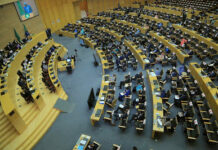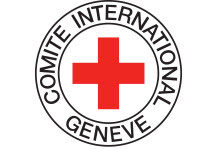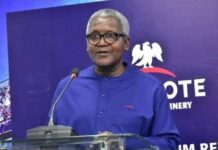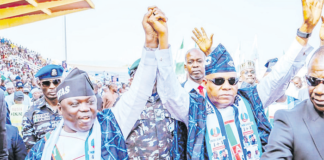Afrobarometer surveys conducted in 2019/2021 showed that citizens in the three countries held largely favourable views of ECOWAS, rating its economic and political influence more positively than that of the African Union

ECOWAS withdrawal the latest chapter in relationship once seen as positive
ACCRA, Ghana, January 31, 2024/ — The decision by Burkina Faso, Mali, and Niger to withdraw from the Economic Community of West African States (ECOWAS) opens a new chapter in a relationship that their citizens have generally seen in a favourable light in the past.
Afrobarometer surveys conducted in 2019/2021 showed that citizens in the three countries held largely favourable views of ECOWAS, rating its economic and political influence more positively than that of the African Union. The perceived positive influence of ECOWAS was equally widespread across all age groups and rural/urban locations, and increased with citizens’ level of education and economic affluence.
But the three West African nations announced this week that they were withdrawing from the regional economic community, complaining of a lack of support and “inhumane” sanctions in the wake of the countries’ military coups.
The surveys were conducted in 2019/2021, before mounting tensions in the region in the wake of recent coups d’état and the imposition of sanctions by ECOWAS and the West African Economic and Monetary Union (UEMOA). Afrobarometer’s 2022 survey in Mali found that while most citizens did not see themselves as the primary beneficiaries of ECOWAS/UEMOA sanctions, only a minority expected the sanctions to lead to the country’s withdrawal from ECOWAS.
Key findings
* On average across 34 African countries surveyed in 2019/2021, about six in 10 citizens (57%) rated the economic and political influence of their primary regional organisations as “somewhat positive” or “very positive”
(Figure 1).

- Citizens’ positive ratings of ECOWAS influence in Burkina Faso (73%), Mali (65%), and Niger (65%) were well above the continental average.
- In comparison, the AU’s influence won positive assessments from 71% of Burkinabè, 59% of Malians, and 58% of Nigeriens.
- In Afrobarometer’s 2022 survey in Mali, citizens cited the closure of land borders (50%), freezing of the country’s financial assets (23%), and suspension of aid and commercial transactions (14%) as the most serious ECOWAS/UEMOA sanctions against their country (Figure 2).
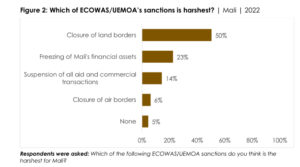
- Only two in 10 Malians (21%) said in 2022 that the country or its citizens have been the primary beneficiaries of the sanctions. Many said the sanctions have mainly benefited certain countries in the sub-region (24%) or no one (23%) (Figure 3).
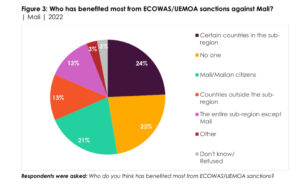
- When asked about likely consequences of the sanctions, only two in 10 Malians (18%) cited withdrawal from ECOWAS (Figure 4).
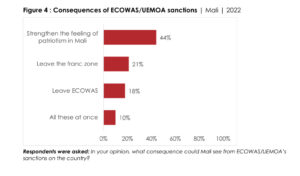
- The largest share (44%) said it would lead to the strengthening of patriotism in the country, while 21% mentioned withdrawal from the franc zone, and 10% considered all three of these consequences likely.

